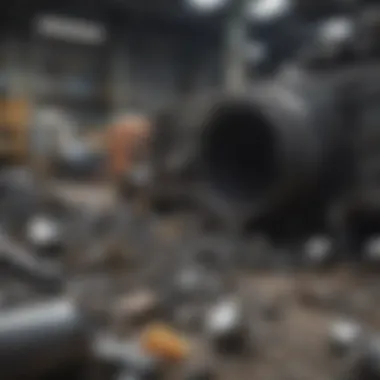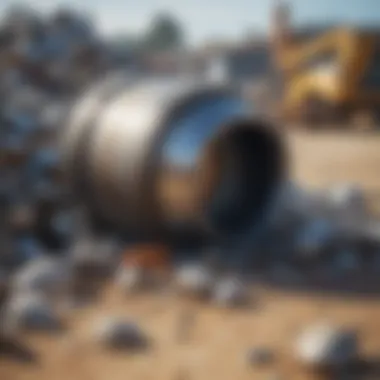Unveiling the Essential Role of Metal Recycling in Long Beach for Environmental Sustainability


Overview of the Topic
Current Status and Challenges
In Long Beach, metal recycling plays a pivotal role in diverting waste from landfills and reducing the strain on natural resources. However, despite its benefits, the current state of metal recycling in the region faces challenges such as limited infrastructure, inadequate consumer awareness, and market fluctuations. These factors hinder the efficiency of recycling processes and the maximization of resource recovery, posing obstacles to achieving optimal environmental outcomes.
Sustainable Solutions
To address the challenges encountered in metal recycling, Long Beach is exploring sustainable solutions aimed at enhancing recycling rates and promoting a circular approach to resource management. Initiatives such as improved collection systems, public awareness campaigns, and incentives for recycling participation are being implemented to boost recycling efficiency and reduce environmental impact. By investing in innovative technology and fostering partnerships between stakeholders, Long Beach is striving to create a more robust and sustainable metal recycling ecosystem.
Impact and Importance
The impact of metal recycling extends beyond environmental benefits to encompass social and economic dimensions. By reducing energy consumption, greenhouse gas emissions, and landfill waste, metal recycling contributes to the preservation of ecosystems and the well-being of communities in Long Beach. Additionally, the importance of metal recycling lies in its ability to conserve valuable resources, create employment opportunities, and pave the way for a more sustainable future for generations to come. Efforts in metal recycling demonstrate a commitment to responsible resource management and environmental stewardship, highlighting the role of Long Beach in driving positive change through sustainable practices.
Introduction to Metal Recycling
Metal recycling holds significant importance in Long Beach due to its environmental impact, economic benefits, and contribution to sustainable resource management. This section serves as a foundation for understanding the key aspects of metal recycling, highlighting the critical role it plays in promoting environmental conservation and resource efficiency in the region.
Understanding the Basics of Metal Recycling
The Concept of Recycling
Metal recycling involves the process of collecting and reprocessing scrap metal to create new products. This practice helps in reducing the demand for raw materials and minimizes energy consumption. The concept of recycling is crucial as it supports the circular economy model by conserving resources and reducing waste generation.
Types of Metals Suitable for Recycling
Different types of metals can undergo recycling, including ferrous and non-ferrous metals like steel, aluminum, and copper. These metals are highly recyclable and retain their properties even after multiple recycling processes. Recycling metals like aluminum can save a significant amount of energy compared to virgin material production.
Impact of Metal Recycling on the Environment
Metal recycling plays a vital role in reducing the environmental impact of metal extraction and production. By recycling metal, carbon emissions are lowered, and natural resources are conserved through reduced mining activities. This sustainable practice contributes to mitigating climate change and preserving ecological balance.
History of Metal Recycling
Origins of Metal Recycling
The practice of metal recycling dates back to ancient civilizations where metal scraps were collected and reused for various purposes. This early form of recycling laid the foundation for modern recycling processes and emphasized the value of reutilizing metal resources.


Evolution of Metal Recycling Practices
Over time, metal recycling practices have evolved with advancements in technology and increased recycling awareness. Modern methods ensure efficient collection, sorting, and processing of metal scrap, promoting a more sustainable approach to resource utilization.
Significance of Metal Recycling
Reduction of Carbon Emissions
One of the key benefits of metal recycling is the significant reduction in carbon emissions compared to primary metal production. Recycling metal requires less energy and emits fewer greenhouse gases, contributing to a cleaner environment and lower overall carbon footprint.
Conservation of Natural Resources
Metal recycling helps in conserving precious natural resources like metal ores, water, and energy. By recycling metals, the need for extensive mining activities decreases, minimizing habitat destruction and environmental pollution associated with resource extraction.
Economic Benefits
Apart from its environmental advantages, metal recycling also offers economic benefits by creating employment opportunities, generating revenue through the sale of recycled metal, and fostering a sustainable economy. The recycling industry contributes to the local economy and promotes a greener approach to industrial activity.
Metal Recycling Process
Metal recycling plays a crucial role in Long Beach, encompassing a series of essential steps aimed at maximizing resource efficiency and environmental benefits. Understanding the intricacies of the metal recycling process is paramount in comprehending its significance within sustainable resource management frameworks. This section will delve into the detailed process of metal recycling, emphasizing its impact on reducing carbon emissions, conserving natural resources, and unlocking economic opportunities.
Collection and Sorting
Collection methods
Metal recycling initiates with various collection methods, each tailored to source different types of metal for recycling. From curbside pick-ups to drop-off centers, these collection strategies ensure a steady influx of metal waste into the recycling stream. Sorting techniques play a vital role post-collection, segregating metals based on type and quality. Utilizing magnetic separation, shredding, and manual sorting, recyclers streamline the materials for further processing. Championing efficiency and precision, collection methods enable a systematic approach to gathering metal waste, optimizing the recycling process's effectiveness. By focusing on enhancing collection logistics and outreach efforts, the metal recycling industry in Long Beach can widen its scope and improve its impact on sustainable resource management.
Sorting techniques
Sorting techniques encompass a meticulous process of categorizing metals into distinct groups for efficient recycling. Leveraging advanced technologies like optical sorting systems and eddy current separators, recyclers can accurately segregate non-ferrous metals from ferrous ones. This precision contributes to higher quality recycled materials useful in manufacturing industries. The unique feature of sorting techniques lies in their ability to enhance the purity and quality of recycled metals, making them more desirable for downstream applications. However, challenges such as labor-intensive sorting processes and the need for continuous innovation to streamline sorting operations persist in optimizing metal recycling's overall effectiveness.
Melting and Purification
Melting process
Melting metal scrap is a fundamental step in the recycling process, transforming solid waste into molten metal ready for purification. By subjecting scrap to high temperatures in furnaces, recyclers can separate impurities and contaminants from the metal, ensuring its integrity and quality for future use. The melting process is pivotal in reducing energy consumption and emissions associated with primary metal production. Highlighting energy efficiency and material recuperation, the melting process underscores the environmental advantages of metal recycling in Long Beach. By adopting innovative melting technologies and sustainable energy sources, recyclers can further enhance the process's eco-friendly credentials.
Purification methods


Following the melting stage, metal undergoes purification to eliminate any remaining impurities, enhancing its quality for manufacturing new products. Techniques like electrolysis and chemical treatments are commonly employed to refine the molten metal, ensuring it meets industry standards. Purification methods are integral in guaranteeing the recycled metal's compliance with stringent quality requirements. The uniqueness of purification methods lies in their ability to elevate the recycled metal's purity, rendering it fit for diverse industrial applications. Nevertheless, challenges such as high energy consumption during purification and the need for continuous improvement of purification technologies underscore the evolving landscape of metal recycling practices.
Forming New Products
Creation of raw materials
Creating raw materials from recycled metal involves shaping purified metal into standardized forms suitable for manufacturing processes. Through processes like rolling, extrusion, and casting, recyclers mold recycled metal into sheets, rods, and other raw materials essential for various industries. This stage is essential in bridging the gap between recycled metal and its transformation into usable components. Emphasizing resource conservation and material diversity, the creation of raw materials plays a vital role in sustaining Long Beach's circular economy. By embracing sustainable production techniques and material innovations, recyclers can contribute to a more resource-efficient ecosystem, diminishing the reliance on virgin materials.
Manufacturing new products
Manufacturing new products from recycled metal entails utilizing the created raw materials to produce goods across different sectors. From automotive parts to construction materials, recycled metal finds applications in diverse industries, showcasing its versatility and economic viability. This stage underscores the circular nature of metal recycling, where end-of-life products are reincarnated into new marketable commodities. Highlighting product diversification and value-added propositions, manufacturing new products fuels Long Beach's economy while promoting a more sustainable industrial landscape. By fostering collaborations between recyclers and manufacturers, the city can harness the full potential of metal recycling, driving economic growth and environmental stewardship.
Benefits of Metal Recycling in Long Beach
Metal recycling plays a crucial role in Long Beach, contributing significantly to environmental sustainability and resource management. By recycling metals, the city can reduce carbon emissions, conserve natural resources, and reap economic benefits. The practice of metal recycling extends beyond mere waste management; it serves as a strategic approach towards a greener and more sustainable future. Understanding the various facets of metal recycling in Long Beach sheds light on its importance not only locally but also globally.
Environmental Impact
Reduction of Landfill Waste
Metal recycling in Long Beach significantly reduces the amount of waste ending up in landfills. This process prevents environmental degradation and minimizes the strain on local waste management systems. The reduction of landfill waste is a critical aspect of metal recycling, emphasizing the importance of effective resource utilization and waste reduction strategies. By diverting metals from landfills, the city can address waste management challenges and promote sustainable practices.
Energy Conservation
Metal recycling contributes to energy conservation by minimizing the need for energy-intensive mining and manufacturing processes. By recycling metals, Long Beach decreases its overall energy consumption and greenhouse gas emissions. Energy conservation in metal recycling plays a vital role in reducing the city's carbon footprint and striving towards energy efficiency goals. Embracing energy-efficient practices through metal recycling underscores Long Beach's commitment to environmental stewardship.
Economic Advantages
Job Creation
Metal recycling in Long Beach stimulates job creation in various sectors such as collection, processing, and manufacturing. The recycling industry offers employment opportunities for local residents, contributing to economic growth and sustainable development. Job creation through metal recycling not only boosts the city's economy but also fosters a skilled workforce and promotes social welfare through employment generation.
Revenue Generation
Metal recycling generates revenue through the sale of recycled materials and products. By monetizing scrap metals, Long Beach can enhance its economic viability and stimulate market activity. Revenue generation from metal recycling supports local businesses, encourages entrepreneurial initiatives, and strengthens the city's financial resilience. The financial benefits of metal recycling underscore its value as both an environmental and economic asset.
Societal Benefits
Promotion of Sustainability


Metal recycling promotes sustainability by encouraging responsible resource management and waste reduction practices. By incorporating sustainability principles into metal recycling, Long Beach cultivates a culture of environmental consciousness and societal responsibility. The promotion of sustainability through metal recycling involves education, advocacy, and community engagement, fostering a sustainable mindset among residents and businesses.
Community Involvement
Metal recycling fosters community involvement by fostering partnerships between local organizations, government agencies, and residents. Community engagement in metal recycling initiatives enhances social cohesion, promotes environmental awareness, and empowers individuals to contribute to a cleaner and greener city. Through community involvement, Long Beach builds a stronger sense of shared responsibility towards environmental preservation and sustainable living.
Challenges and Future Prospects
Metal recycling in Long Beach faces various challenges and holds promising future prospects. Understanding these dynamics is crucial for the sustainable advancement of metal recycling practices in the region. The challenges encompass issues such as contamination concerns and lack of awareness among the populace. Overcoming these obstacles is key to ensuring the efficiency and effectiveness of metal recycling processes. On the other hand, the future holds innovations that can revolutionize the industry, paving the way for more streamlined and eco-friendly practices.
Obstacles to Effective Metal Recycling
Metal recycling encounters significant hurdles that impede its seamless operation within Long Beach. Two primary obstacles include contamination issues and lack of public awareness regarding the benefits of recycling metal. Contamination poses a considerable threat to the quality of recycled metal, potentially compromising its reusability and environmental impact. Simultaneously, the lack of awareness among individuals and businesses about the significance of metal recycling inhibits the growth and optimization of recycling activities, limiting its overall effectiveness.
Contamination Issues
Contamination is a critical aspect affecting metal recycling in Long Beach. The presence of impurities and non-metallic elements in recycled metal can significantly reduce its quality and functionality. Contaminants like oil, debris, and other substances can pose challenges during the recycling process, requiring extensive purification efforts. Addressing contamination issues is imperative to maintain the integrity of recycled metal and maximize its reusability, contributing to sustainable resource management.
Lack of Awareness
The lack of awareness regarding metal recycling poses a notable challenge in Long Beach. Many individuals and organizations remain uninformed about the environmental and economic benefits associated with recycling metal. This lack of knowledge results in a lower participation rate in recycling programs and hampers the overall efficiency of metal recycling initiatives. Educating the public about the importance of metal recycling is essential to foster a culture of sustainability and promote responsible waste management practices.
Innovations in Metal Recycling
Innovations in metal recycling technologies and practices present opportunities to enhance the efficiency and sustainability of recycling processes in Long Beach. Advanced technologies and sustainable practices are at the forefront of driving innovation within the metal recycling industry. These advancements aim to streamline operations, reduce environmental impact, and increase the overall effectiveness of recycling efforts, shaping a more eco-conscious future for metal recycling in the region.
Advanced Technology
The integration of advanced technology in metal recycling operations revolutionizes the way metals are processed and repurposed. Cutting-edge machinery and automation systems enable more precise sorting, melting, and purification of metals, resulting in higher purity levels and increased recycling yields. Leveraging advanced technology enhances the overall efficiency of metal recycling processes, making them more sustainable and cost-effective in the long run.
Sustainable Practices
Adopting sustainable practices in metal recycling is paramount to reducing the industry's environmental footprint and enhancing resource conservation. Practices such as energy-efficient melting processes, utilization of renewable energy sources, and implementation of closed-loop systems contribute to a more sustainable metal recycling ecosystem. By prioritizing sustainability in recycling operations, Long Beach can mitigate environmental impacts, promote eco-friendly practices, and drive positive change within the recycling industry.
Future Trends in Metal Recycling
The future of metal recycling in Long Beach is marked by emerging trends that aim to reshape the landscape of recycling practices and policies. Circular economy initiatives and policy developments play a pivotal role in driving sustainable resource management and promoting a closed-loop approach to metal recycling. Embracing these trends reinforces the commitment to environmental stewardship and resource efficiency, setting the stage for a more resilient and circular economy within the metal recycling sector.
Circular Economy Initiatives
Circular economy initiatives focus on closing the loop of metal production and consumption, emphasizing the reusability and recyclability of materials throughout their lifecycle. By implementing circular economy models, Long Beach can minimize waste generation, conserve resources, and reduce environmental impact associated with metal production. These initiatives drive innovation, foster collaboration among stakeholders, and create a more sustainable framework for metal recycling practices in the region.
Policy Developments
Policy developments play a crucial role in shaping the future of metal recycling by enacting regulations and guidelines that promote responsible waste management and sustainable resource utilization. Robust policies governing metal recycling practices ensure compliance, accountability, and environmental protection, safeguarding the interests of the community and the ecosystem. By aligning with progressive policies and standards, Long Beach can enhance its metal recycling infrastructure, incentivize environmentally conscious practices, and contribute to a greener and more sustainable future.



